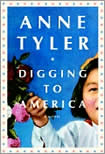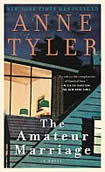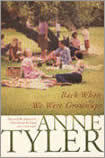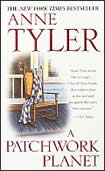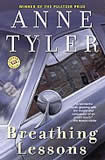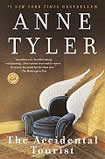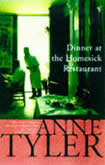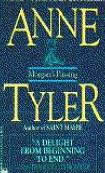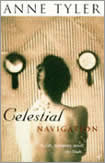Anne Tyler
posted Apr 8, 2006
Anne Tyler lets her work speak for itself. Every few years, she produces a new novel, and each sells well and is praised by critics, though she does little to promote it—she rarely makes public appearances, and almost never grants interviews. In an age when publishers so emphasize publicity, and selling authors as personalities, her focus on writing alone is refreshing.
And of course her novels and stories are wonderful. So our fiction editor Margo Rabb was thrilled by the chance to ask her about her work, her approach to her craft, and, in particular, her latest novel, Digging to America.
| * * |
What was the inspiration for Digging to America? Does your knowledge of Iranian-American life come primarily from your experience as the wife of an Iranian man, or mainly from research?
I wish I could claim I had ever had an inspiration for a novel! Digging to America began with my thinking about the subject of adoption. (It interested me because it's so dramatic and so sudden, compared with childbirth.) That one of the families should be Iranian was a last-minute whim, just to make the writing more fun.
Nothing in my books comes from real life, but the general tone of my beloved Iranian in-laws' conversations—their fondness for a good story, their vivid narrative style, their fascination with the issue of "American" vs. "non-American"—has certainly colored the scenes involving the Hakimis.
In Digging to America’s opening scene, the day of Susan’s and Jin Ho’s arrival at the Baltimore airport from Korea, your descriptions are so detailed and vivid that a reader gets the impression you’ve witnessed such a scene yourself. Have you? More generally, do you find that your memory, or your imagination, is of more help in crafting a good scene?
Like almost everyone, I have been a fascinated bystander at more than a few of those arrival scenes. But the specific details of the arrival scene in my book are manufactured, and it is always imagination I rely upon rather than my own memory—which is, I've found, disconcertingly focused, in a not very helpful way. (I might have only the vaguest, blurriest recollection of someone, but his cushioned-looking, bitten-down fingernails will stay with me forever.)
Though your new novel shifts perspectives, it is predominantly told from Maryam's point of view. Her character is so appealing in the way she changes and opens up toward the end of the book. Out of all the novel’s characters, did you feel closest to her?
I did feel closest to Maryam, although I would not have predicted that. As Bitsy says, she's a little intimidating, but as I got to know her better I came to like her enormously.
In Digging to America, you note that your character Dave "… took some pleasure in [an] uncomplicated, coloring-book version of the world, where children in Mao jackets and children in Levis understood each other so seamlessly." In the aftermath of September 11th, and amid the war in Iraq, do you hope that your novel, for American readers, might help to foster such understanding?
I would love it if my book fostered such understanding, even though I can't claim that as my aim in writing it.
When I'm working on something, I proceed as if no one else will ever read it. It's the only way I can write unself-consciously. Not until the final draft do I force myself to remember that I'm going to have to think about how it will affect other people.
Digging to America is filled with parties that bring families together, and are reminiscent of the parties in Back When We Were Grownups—occasions at which joy is tempered by stress brought on by family conflict. Are you drawn to writing about parties? While you were working on this new book, did you notice any connections between these two novels?
I forget a book as soon as I finish writing it, which is not always a good thing. (It means I sometimes repeat myself.) So no, I didn't notice any connections.
My fondness for party scenes is partly utilitarian (what better way to percolate something among my characters?) and partly wishful thinking. In real life I avoid all parties altogether, but on paper I can mingle with the best of them.
In your essay "Still Just Writing," you wrote eloquently about balancing motherhood with writing. Over the course of your seventeen novels, how has your writing life changed? Has any novel given you more trouble than the others? Which was the hardest to work on?
The hardest novel to write was Dinner at the Homesick Restaurant. (It's also my best, I think.) I can never tell ahead of time which book will give me trouble—some balk every step of the way, others seem to write themselves—but certainly the mechanics of writing, finding the time and the psychic space,are easier now that my children are grown.
In an earlier failbetter.com interview, Nick Hornby cited your novel, The Accidental Tourist, when commenting on the “Americanization of the world.” He said, “It's funny, but Anne Tyler's wonderful Accidental Tourist, written in 1985 or thereabouts, makes almost no sense now—her central character is a guy who writes guide books for cautious Americans traveling abroad, and this indicates his personal nervousness and lack of adventure. But now, of course, it seems to us as though every American is an accidental tourist…” What do you think of this interpretation? Could you have written The Accidental Tourist now?
Oh, of course I could! Not all that long ago I watched an American fellow traveler slurping unidentified raw shellfish from the murky waters off the coast of Tunisia; and of course we all know the other kind, the ones who travel with their own bottles of Jif peanut butter. There are still plenty of places in this world where you can prove your stretchability, or lack of it.
Hornby and many others have cited your novel Dinner at the Homesick Restaurant as a major influence on their own writing. Are there any young authors whose work reminds you of your own? Do you ever read something by a young author and think you see your influence on his or her work?
No, I don't. When I read, I'm purely a reader. I just want to be told a story, and I want to believe I'm living that story, and I don't give a thought to influences or method or any other writerly concerns.
You have said that you go through a "refilling" stage after finishing a novel—how long does this stage generally last? Once you return to work, how do you start—by outlining, drawing up character histories, or jumping right into writing? How many hours do you write each day?
I spend about a year between novels. My decision to start a new one is just that, a decision, since I never get inspirations. I'll say, "It's time I stopped lolling about. I'd better think something up." Then for a month or so I'll jot down desperate possibilities. "Maybe I could write about a man who does such-and-such. Or wait: I think I already did that. Well, then maybe about that woman I saw in the grocery the other day. What was she up to, exactly? What might her story have been?"
Eventually, one of these possibilities will start flowering in my mind, and I'll manufacture what's initially a very trumped-up, artificial plot. I'll write maybe one long paragraph describing the events, then a page or two breaking the events into chapters, and then reams of pages delving into my characters. After that, I'm ready to begin.
My writing day has grown shorter as I've aged, although it seems to produce the same number of pages. At most I'll spend three or four hours daily, sometimes less. The one ironclad rule is that I have to try. I have to walk into my writing room and pick up my pen every weekday morning. If I waited till I felt like writing, I'd never write at all.
Your writing style is deceptively simple and straightforward. What do you think of the slew of young writers who take the opposite tack—whose works feature copious footnotes, diagrams, labyrinthine sentences, and the like?
I have enjoyed the work of some of those writers, in the same way that I might enjoy a particularly intriguing puzzle. But what I hope for from a book—either one that I write or one that I read—is transparency. I want the story to shine through. I don't want to think of the writer.
You prefer not to do book events or book tours. Do you worry they would sap your energy for writing, or disrupt your non-writing life?
Any time I talk in public about writing, I end up not able to do any writing. It's as if some capricious Writing Elf goes into a little sulk whenever I expose him.
Even this e-mail interview will make me uncomfortably aware of the process for the next few days, but at least with e-mail there's a manageable length of time involved, and therefore the effects won't last as long.
Toward the end of Digging to America, Maryam thinks, “Wasn’t the real culture clash the one between the two sexes?” Do you think that’s true?
She worded it a bit strongly, but I do find myself more and more struck by the differences between the sexes. To put it another way: All marriages are mixed marriages.
Many of your novels have joyful endings, or endings that indicate future joy for the characters. Do you consciously try to end them this way, rather than on a bleak note? If so, why?
I consciously try to end my novels at a point where I won't have to wonder about my characters ever again. Often this does mean ending on a positive note, but not always. Celestial Navigation ended quite sadly. So did Morgan's Passing, although no one seemed to realize it.
You have said that you write extensive background profiles of each of your characters. Can you describe this process—how long do you spend on them, and what do they include? How do you integrate the information in them into your novels? Do you ever profile a character, then drop him or her from a book?
I do write long, long character notes—family background, history, details of appearance—much more than will ever appear in the novel. I think this is what lifts a book from that early calculated, artificial stage. One day, around chapter 2 or 3, I'll be slogging through some dialogue and all of a sudden a character says something that makes me laugh. Where did that come from? I'm not funny! Then another will flatly refuse the plot contrivance I've designed for him. I'll write a scene this way, write a scene that way; it slows to a crawl and stops. Finally, I say, "Oh, all right," and I drop the contrivance and the scene falls into place and I see a motive I'd never guessed and I understand where we're going. It's as if someone else is telling me the story. I don't want to say I hear voices; well, actually I do hear voices, but I don't think it's supernatural. I think it's just that when characters are given enough texture and backbone, then lo and behold, they stand on their own.
You’ve written short stories for such magazines as The New Yorker, Redbook, and Harper's, but never published them in a collection. Do you have plans to do so? Do you still write short stories? Do you prefer the form of the novel, and if so, why?
I believe I go into a short story unconsciously telling myself that it's "only" a short story. Ridiculous, when you think of William Trevor's short stories, or Alice Munro's, but there you are. I save the best of myself for novels, and I believe it shows. My stories are never quite good enough. I don't know if I'll ever write any others, but of those I have written, there are only five or so that I allow to be reprinted anywhere, and five doesn't make a collection.
© 2006 failbetter LLC · all rights reserved





